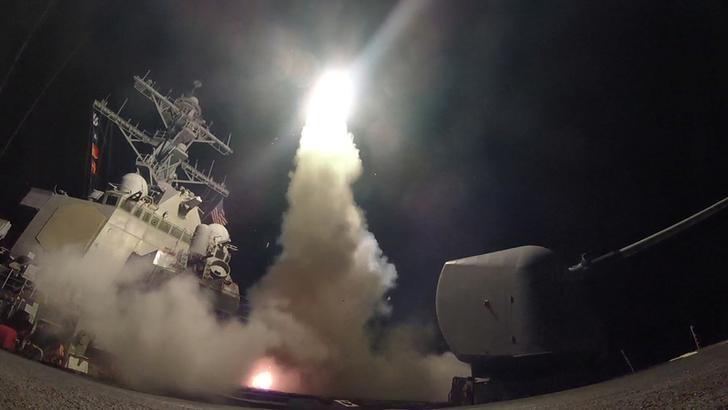Reactions from Iran, Russia and Syria following the US attack on Shayrat military airbase were exactly as expected. Condemnation statements were issued.
The US strike came in response to the Syrian regime’s mass murder chemical attack on civilians on Friday morning, the day everyone in the region suddenly woke up to the new US stance.
Later that day, the tripartite media outlets- Russian, Iranian and Syrian- and social networking pages shared their fake news that questioned whether the Syrian regime was really behind the toxic gas attack in Idlib.
The media outlets promoted news that the Syrian opposition had shelled Khan Sheikhoun. Then they marketed another story claiming that the Syrian air force did indeed shell areas of the “armed terrorist opposition-held” and the strikes hit a terrorist storage containing chemical gases similar to that previously used by ISIS in Iraq.
By claiming that, the opposition is the party that committed the crime of possessing internationally prohibited chemical weapons.
However, this story was only believable to Damascus camp supporters.
The propaganda was altered the next day in light of the new development represented in Arab reactions welcoming the US strike on Syria.
The Arab popular stance had turned and welcomed the move after it had been angry with Trump’s administration due to reports accusing it of taking restrictive measures against Muslim refugees and travelers.
In response to the sense of joy and victory, fake news surfaced claiming that the US strike was a mere charade carried out in agreement with Russia.
Media outlets published forged photos showing some burnt airplanes inside concrete bunkers that weren’t shelled, trying to debunk the US strike narrative. Other news reports admitted that the strike happened but said it was a failure without achieving any goals.
It’s true that influencing the Syrian and regional public opinion is an important part of the psychological war, but it’s not definitive. Military operations are usually a result of political actions.
The US strike sent political messages to the Syrian, Iranian and Russian governments, followed by messages to the Syrian public.
The strike, which destroyed a few jets and killed six military personnel from the Syrian regime, will shake the conviction of those who support the regime so they don’t bet on it anymore. It will also provide the opposition with a dose of hope following political disappointments and military defeats they witnessed recently.
Shelling Shayrat airbase will not stop the aggression of the military alliance in support of Damascus regime, especially that it resumed bombarding civilians on Friday further defying everyone.
The US strike will not alter the balance of power on ground. It’s also unlikely that there will be any new US military strikes. The United States Ambassador to the United Nations said the possibility of US’s military intervention depends on whether the Syrian regime reuses chemical weapons or not which is unlikely at the time being.
The new and important thing now is political positioning as it seems that Trump administration changed its stance and decided to be a party in the Syrian crisis. Previous statements, said that the administration was only concerned in fighting ISIS in Syria. Therefore, the victory announced by Damascus and its allies has become far-off.
Until a week ago, most regional and international powers announced or conveyed their approval to the Syrian solution as per Moscow’s desire thus leaving Assad in power and ending the armed opposition.
However, the chemical attack and other attacks on civilian areas occurred, in addition to the arrogant statements of Syrian government officials against other countries in the region, which prompted all countries to reconsider the whole situation.
Once again, the Assad regime proved it cannot change its behavior and that it’s responsible for the major relapse in Syria, regardless whether Iran and Russia agree to its crimes or not.
